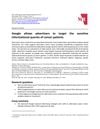 March 2021 in “The British Journal of Psychiatry”
March 2021 in “The British Journal of Psychiatry” Countries with stricter cultures had fewer COVID-19 cases and deaths, paranoia is linked to false memories, psychosocial intervention works as well with or without antipsychotic drugs for young people with psychosis, smartphones can detect changes in behavior indicating illness relapse, and recruitment agents show regional and gender biases.
 1 citations,
July 2019 in “Journal of the American Academy of Dermatology”
1 citations,
July 2019 in “Journal of the American Academy of Dermatology” Case reports are crucial for identifying new medical conditions and improving knowledge retention.
 38 citations,
April 2017 in “Journal of The American Academy of Dermatology”
38 citations,
April 2017 in “Journal of The American Academy of Dermatology” Many skin patients have mental health issues, but few dermatologists are well-versed in treating these conditions.
 1 citations,
July 2017 in “Frontiers in Communication”
1 citations,
July 2017 in “Frontiers in Communication” Using complex medical terms can make people want to seek medical help faster.

Google should ban ads targeting cancer patients with sensitive health-related keywords to protect them from misleading information.
 June 2024 in “Nature Cell and Science”
June 2024 in “Nature Cell and Science” The Scalp Coverage Scoring method reliably measures hair density from images.
 February 2024 in “Bőrgyógyászati és venerológiai szemle”
February 2024 in “Bőrgyógyászati és venerológiai szemle” Psychological issues with skin problems worsen patients' lives and treatment.
December 2021 in “Pediatrics in review” Recognizing skin symptoms in children can help diagnose and manage serious diseases early.
 14 citations,
April 2019 in “PLOS ONE”
14 citations,
April 2019 in “PLOS ONE” Skin cancer is common in elderly nursing home residents, with risk factors including being male, having light skin, outdoor work history, and smoking. Regular skin checks are recommended.
 128 citations,
September 2013 in “Journal of Clinical Epidemiology”
128 citations,
September 2013 in “Journal of Clinical Epidemiology” The conclusion is that the risk of losing significance in meta-analysis results increases with smaller effects and more missing data, and using the median standard deviation for imputation is recommended.
 December 2023 in “Current psychosomatic research”
December 2023 in “Current psychosomatic research” Psychological interventions can improve the quality of life for women with PCOS.
 April 2023 in “JMIR Research Protocols”
April 2023 in “JMIR Research Protocols” The study aims to create a model to predict health attributes using diverse health data from Japanese adults.
 1 citations,
April 2016 in “British Journal of Dermatology”
1 citations,
April 2016 in “British Journal of Dermatology” Buschke-Ollendorff syndrome is a rare genetic disorder causing skin and bone changes, with some cases also showing ADHD or developmental delays.
 95 citations,
April 2013 in “PLOS ONE”
95 citations,
April 2013 in “PLOS ONE” Ginseng is possibly safe but its effectiveness is unclear due to poor quality studies and mixed results.
11 citations,
January 2018 in “International Journal of Trichology” The true incidence of post-Finasteride syndrome is unclear, and more research is needed.
 20 citations,
August 2019 in “Expert Opinion on Drug Safety”
20 citations,
August 2019 in “Expert Opinion on Drug Safety” Some medications for bladder problems can cause memory issues or mood changes, and doctors should monitor these side effects.
 3 citations,
September 2022 in “Frontiers in psychiatry”
3 citations,
September 2022 in “Frontiers in psychiatry” University students in Egypt experienced high stress during COVID-19's third wave, with negative coping mechanisms being more common.
 2 citations,
November 2020 in “Fertility Research and Practice”
2 citations,
November 2020 in “Fertility Research and Practice” The survey helps identify menstrual irregularities and excess male hormones, aiming to detect conditions like Polycystic Ovary Syndrome.

Ziziphus jujuba and Eclipta alba leaf extracts improve blood sugar levels and cognitive function in diabetic rats.
 November 2020 in “Psychoneuroendocrinology”
November 2020 in “Psychoneuroendocrinology” Finasteride might affect memory by impacting cholinergic system.
 81 citations,
June 2014 in “American Journal of Men's Health”
81 citations,
June 2014 in “American Journal of Men's Health” Finasteride can cause lasting sexual, emotional, and cognitive issues, with varying severity.
 May 2024 in “Scientific Reports”
May 2024 in “Scientific Reports” Androgen receptors in the mouse brain may explain cognitive and mood changes in prostate cancer treatment.
 46 citations,
September 2011 in “Movement Disorders”
46 citations,
September 2011 in “Movement Disorders” Finasteride reduces Tourette syndrome symptoms, but results may be limited due to potential biases.
 6 citations,
June 2021 in “Journal of health psychology”
6 citations,
June 2021 in “Journal of health psychology” The article suggests that the view of male baldness as a medical issue is influenced by commercial bias and calls for more unbiased research.
 9 citations,
January 2018 in “American Journal of Men's Health”
9 citations,
January 2018 in “American Journal of Men's Health” Finasteride use can cause lasting negative effects like sexual dysfunction, depression, anxiety, and cognitive issues.
 451 citations,
March 2005 in “Endocrine Reviews”
451 citations,
March 2005 in “Endocrine Reviews” The enzyme steroid sulfatase is linked to breast cancer and other conditions, and inhibitors are being developed for treatment.
 237 citations,
January 2010 in “The Journal of Sexual Medicine”
237 citations,
January 2010 in “The Journal of Sexual Medicine” The report recommends personalized treatment for women's sexual dysfunctions and more research on effective therapies.
 17 citations,
September 2020 in “Journal of Endocrinological Investigation”
17 citations,
September 2020 in “Journal of Endocrinological Investigation” Post-finasteride patients show changes in gut bacteria, possibly causing various symptoms.
 9 citations,
February 2016 in “Cambridge University Press eBooks”
9 citations,
February 2016 in “Cambridge University Press eBooks” The conclusion is that self-concept, shame, and emotion regulation are key factors in hoarding disorder, body dysmorphic disorder, and trichotillomania, and should be targeted in treatment and research.
 2 citations,
July 2016 in “Pharmacopsychiatry”
2 citations,
July 2016 in “Pharmacopsychiatry” A person with Turner Syndrome showed severe schizophrenia that didn't respond to treatment and had brain shrinkage.



























